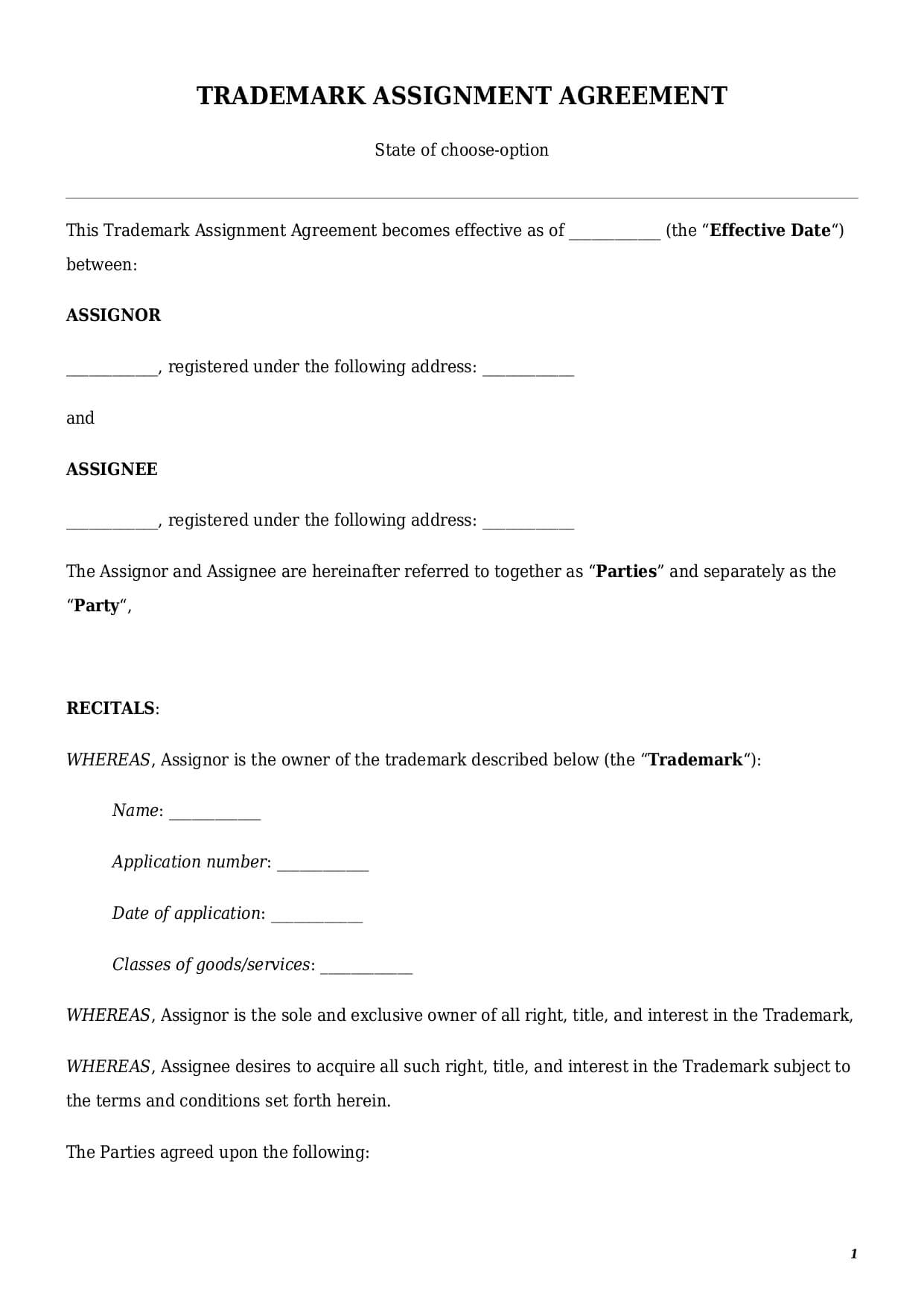Trademark Assignment Agreement
Reviews


What is a trademark assignment agreement?
A trademark assignment agreement is a legal contract used to transfer ownership rights for a trademark from one person to another. In other words, under this type of contract, an owner may transfer or sell all or some intellectual property rights in a trademark. Once the assignment or the transfer is complete, another party becomes the new owner of those rights. Therefore, a trademark assignment agreement is widely known as a trademark purchase agreement.
A typical trademark assignment contract sets up a rigid legal framework covering the following aspects of the assignment:
- full details of the parties involved;
- details of the description of a trademark involved;
- scope of rights to be transferred;
- owner’s legal representations and warranties;
- general provisions (e.g., applicable law, severability, indemnity, etc.).
The parties involved in a trademark purchase agreement are the assignor and the assignee. The assignor is an owner of a trademark who could be either an individual or a legal entity. The ownership for a trademark shall be confirmed by a certificate of registration of a trademark issued by the U.S. Patent and Trademark Office (the “USPTO”). If a trademark is not registered yet, the owner of a future trademark is considered the person who first submitted the application for its registration.
A trademark assignment contract shall not be confused with a trademark licensing agreement. Under a licensing agreement, an owner transfers all or some rights in a trademark for a limited period of time. In the case of a licensing agreement, the owner of the trademark remains the same at all times.
How to write an assignment agreement?
Drafting a trademark assignment agreement could be a challenging task for everyone. Below we created a detailed explanation of every clause a solid trademark assignment agreement template should have.
Description of the Trademark
A good contract template dealing with a trademark transfer should include its detailed description:
- name of a trademark;
- class of goods/services for which a trademark is/will be registered;
- USPTO number and the date of registration for a registered trademark;
- application number and date of application to USPTO, for a trademark with pending registration.
Representations and Warranties
Every solid trademark assignment agreement template should contain the assignor’s representations and warranties. They are legal guarantees an assignor provides to a trademark’s future owner.
As a rule of thumb, a contract template shall include the following representations:
- that the trademark is not currently subject to any court dispute, litigation, or arbitration;
- that the assignor has a full legal right and title to transfer the trademark;
- that the trademark’s registration with the USPTO is valid.
If a trademark is subject to any licensing agreements with third parties, the new owner should be informed of the same. In particular, the text of a final contract shall include the reference to the name, date, and third party with which such a licensing contract was concluded.
Usually, a transfer of ownership for a trademark does not automatically terminate existing license agreements. It simply means for a new owner of a trademark that they become a party to an existing license agreement.
Compensation
Compensation is another key element every trademark assignment agreement template should have. In particular, the parties to a contract shall agree upon:
- the sale price of a trademark;
- payment deadline (e.g., date of signing, after the registration etc.);
- acceptable methods of payment (e.g., cash, bank transfer); and
- coverage of recordation fees with the USPTO?
Recordation
The registration certificate confirms the ownership for a trademark. Once the parties sign the trademark assignment contract, they have to proceed with its recordation in the USPTO. Therefore, the text of a contract shall define the following important aspects:
- Which party shall be responsible for filing the application for the change of the owner? and
- Who shall bear all expenses related to such a recordation?
Parties may agree to split up all expenses in equal parts or in any other way they prefer.
On top of that, an assignment contract may include an additional obligation for an assignor to actively assist the assignee and provide all required documentation or information required for completion of the recordation in the USPTO.
How to customize a trademark assignment agreement at Faster Draft?
To get a personalized legal document template, follow a few easy steps below:
- Click the button “Create Document.”
- Answer simple questions in the questionnaire.
- Select a document’s format—trademark assignment agreement PDF or Word.
- Make a payment.
- Download, print out, sign, and use the customized template in a few minutes.
Table of content
Frequently Asked Questions (FAQ)
-
1. What is the difference between a copyright assignment agreement and a trademark assignment agreement?
A copyright assignment agreement is a legal contract by virtue of which a copyright’s owner transfers the full ownership, right, and interest in a copyright to another party. Under a copyright assignment agreement, the intellectual property rights for books, musical recordings, software, design, and other artworks could be transferred between the parties.
A trademark assignment agreement is similar to a previous contract with one exception only. Under this type of contract, only intellectual property rights for a trademark could be transferred.
-
2. What is a trademark purchase agreement?
A trademark assignment agreement is widely being referred to as a trademark purchase agreement.
If we explain the legal nature of this contract in simple words, an owner of a trademark basically sells all or part of the rights for a trademark they own to another person.
However, legally speaking, the more correct word to use in this context would be “assignment” or “transfer of rights” instead of a simple “purchase.” The word “purchase” would be more common for sale-purchase transactions of real estate or other tangible assets like vehicles, antiques, goods, services, etc.

Looking for something Different?
Start typing to find out our collection of legal documents and contract templates
